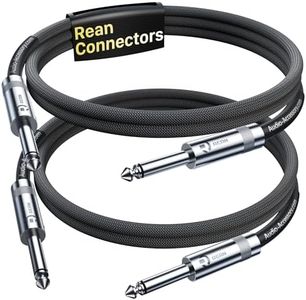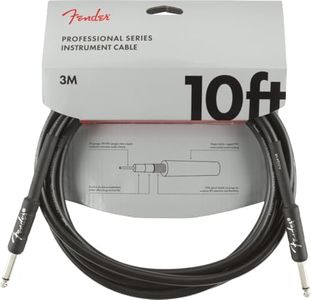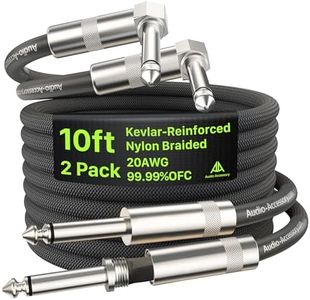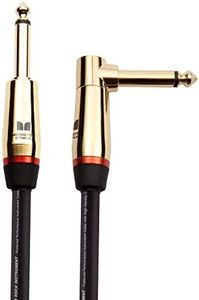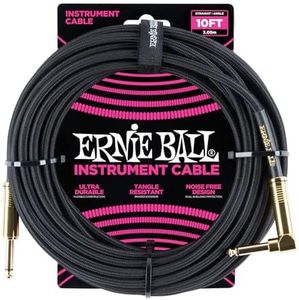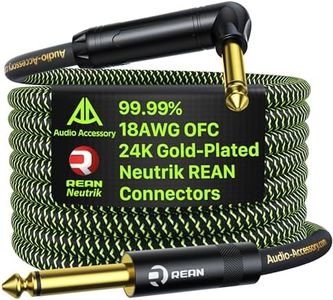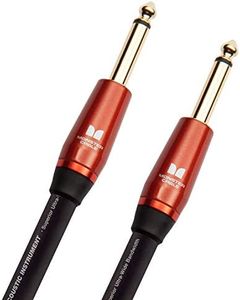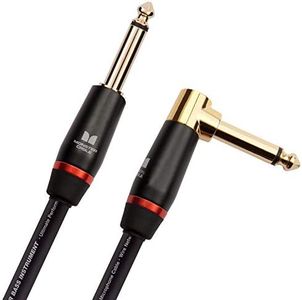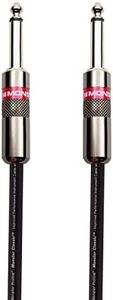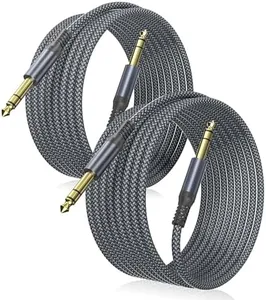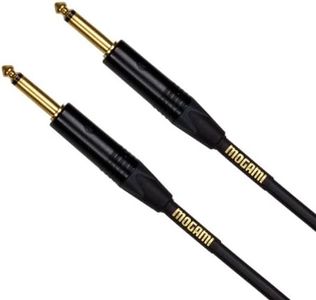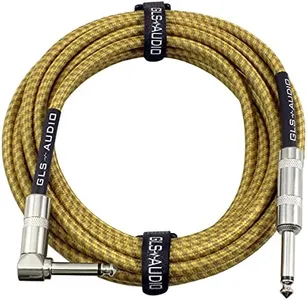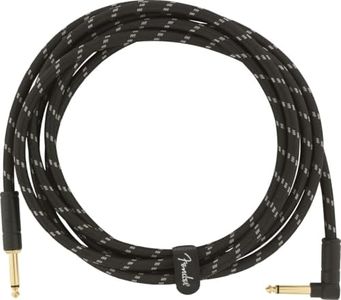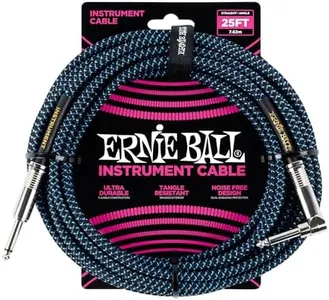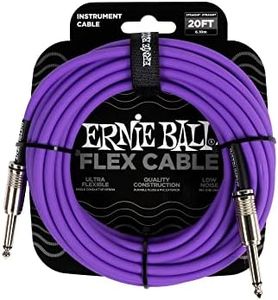10 Best Instrument Cables 2026 in the United States
Our technology thoroughly searches through the online shopping world, reviewing hundreds of sites. We then process and analyze this information, updating in real-time to bring you the latest top-rated products. This way, you always get the best and most current options available.

Our Top Picks
Winner
Fender Professional Series Instrument Cable, Guitar Cable 10 ft, Guitar Accessories, Stage Ready with Anti-Kinking Design, Black
Most important from
14670 reviews
The Fender Professional Series Instrument Cable is a 10-foot cable designed for guitar and other musical instrument use. One of its most notable strengths is its excellent anti-kinking design, which ensures that it remains flexible and free from twists and physical memory. This feature is particularly beneficial for stage performances where flexibility and ease of use are crucial.
The 95% oxygen-free spiral shielding effectively minimizes handling noise, contributing to a cleaner sound quality. With a 22-gauge conductor, the cable provides a strong signal path, and the 8mm PVC jacket adds a layer of durability and reduces noise interference. The nickel-plated connectors are sturdy and reliable, which enhances the performance and longevity of the cable.
While the cable is durable, its 10-foot length might not be sufficient for all setups, especially in larger venues. However, Fender offers this cable in various lengths to cater to different needs. This cable is well-suited for musicians looking for a reliable, high-quality instrument cable with good noise reduction and durability features.
Most important from
14670 reviews
AA AUDIO ACCESSORY Right Angle Guitar Cable 10 ft 2 Pack, Nylon Braided Anti-Kinking Kevlar-Reinforced, 20 AWG 99.99% OFC 1/4 Instrument Cable, AL & OFC Shielded Guitar Cord for Fender Electric Guitar
Most important from
922 reviews
The AA AUDIO ACCESSORY Right Angle Guitar Cable 10 ft (2-pack) is designed for guitar players seeking a durable, high-quality connection between their instrument and amplifier. The 10-foot length suits most playing setups, while the right-angle to straight 1/4 inch TS connectors from the trusted Neutrik Rean brand offer reliable and sturdy connections that resist damage from frequent plugging and unplugging. One standout feature is the extensive five-layer shielding, including aluminum foil and a high-purity 99.99% oxygen-free copper braided shield, which helps deliver a clear, noise-free sound by reducing interference. The cable uses a thick 20 AWG wire, which is better than thinner wires at preserving signal quality with minimal loss or tonal dulling, thanks also to its low capacitance design.
Durability is a strong point here: the Kevlar reinforcement means the cable can handle over 50,000 bends—far more than typical cables—making it ideal for musicians who move around or frequently coil their cables. The nylon braided outer layer adds flexibility and abrasion resistance, reducing chances of kinks or damage. Heat-shrink strain relief at the connectors further protects solder joints from breaking, extending the cable’s life. The inclusion of a lifetime warranty shows confidence in build quality.
Some users may find the right-angle connector less convenient in tight pedalboard setups, depending on their gear arrangement. Additionally, while the cable is designed to be flexible, the thicker gauge and added reinforcement make it slightly heavier and less bendy than ultra-light cables. This cable serves as a solid choice for guitarists looking for a robust, clear-sounding cable that lasts, especially those who value durability and noise reduction.
Most important from
922 reviews
Monster Prolink Rock Instrument Cable. 12 ft Right Angle to Straight Guitar Cable. for Electric Guitar Cable. 95% Copper Braided Shielded Guitar Cable
Most important from
382 reviews
The Monster Prolink Rock Instrument Cable, measuring 12 feet in length with a right-angle to straight connector configuration, is designed for electric guitars. This cable is highly durable, featuring a Duraflex protective jacket and 95% copper braided shielding, which help minimize interference and hum, ensuring clear audio quality. The gold connectors contribute to reliable and long-lasting performance.
With a microfiber dielectric and a multi-gauge wire network, the cable offers pure sound and clarity, making it suitable for musicians who prioritize sound quality. Its carbon-infused polymer reduces handling and vibration noise for a consistent audio experience, ideal for both indoor and outdoor use. Additionally, the cable is versatile and compatible with various electric instruments and audio equipment, enhancing its value.
The lifetime warranty provides added peace of mind for users. However, the product is relatively heavier (8.3 ounces) compared to some alternatives, which might be a consideration for those who prefer lighter cables.
Most important from
382 reviews
Buying Guide for the Best Instrument Cables
Choosing the right instrument cable is crucial for ensuring the best sound quality and performance of your musical instruments. Whether you're a professional musician or a hobbyist, understanding the key specifications of instrument cables will help you make an informed decision. Here are the main factors to consider when selecting an instrument cable.FAQ
Most Popular Categories Right Now
